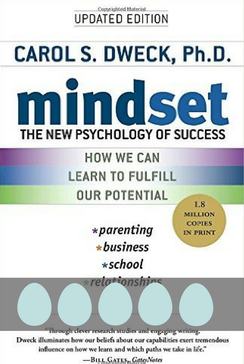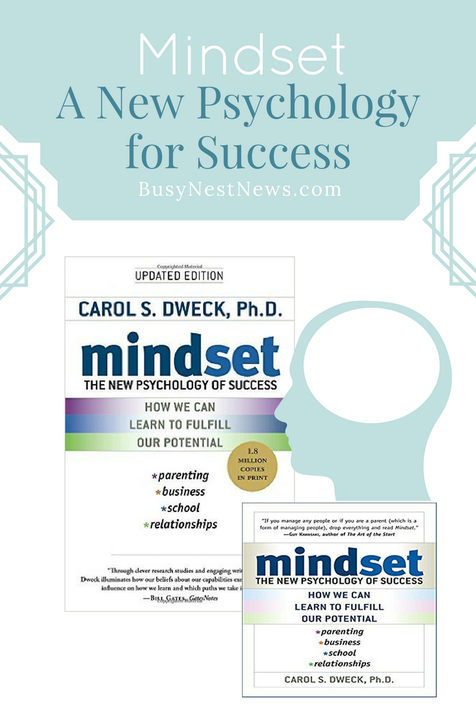|
By Ariel In which Ariel and Brianna discuss how influential the book Mindset: A New Psychology of Success by Carol Dweck will be on their parenting careers. This post contains affiliate links. By using them, you're helping to keep Busy Nest News running. Thanks! Mindset: A New Psychology of Success by Carol Dweck Summary: Mindset Mindset: A New Psychology of Success by Carol Dweck explores how something as simple as how we think about our talents and abilities can have a profound influence on our lives and the lives of those around us. Individuals with a fixed mindset believe that their abilities are largely unchanged from birth. Whereas individuals with a growth mindset believe we must consciously develop our abilities. We must grow them. The fixed mindset is limiting, while the growth mindset can lead to unlimited potential. Review: Mindset This book. This book will have a profound effect on my life. And if you let it, it may just have a profound effect on yours, too. But make sure you read the updated version! Dweck addressed many of what would have been my complaints about the original published text with this revised edition.  I approached this book with many expectations – both good and bad. Mindset, which was originally published in 2006, introduced the idea that our thought patterns impact our chances for success. Specifically how we approach our talents and abilities. Are we born with them? Or are they developed? Those with the fixed mindset believe that athletes are born with a natural physical prowess. That artists are born with an eye for shape and form. That musicians are born with an ear for pitch and tone color. Those that have it, simply have it. Those with the growth mindset believe that, yes natural ability does exist, but our success hinges upon how we develop these abilities. But these concepts might be familiar to you. They were to me. Dweck’s approach to mindsets went viral when the book was first published. But along with any broadly embraced concept comes misunderstandings that undermine implementation. The mindset approach was no different. In the ten years since introducing the mindsets, Dweck has improved her own understanding of how they work and how to develop a growth mindset in children, in adults and in organizations. So read this book, but read the revised edition released in 2016. If you are buying brand new it won’t be an issue. If you are buying used, just make sure the copy says revised edition on the cover.. In the world of psychological research, ten years represents leaps and bounds in our understanding of the human psyche. As I said, I had expectations. One such bias – was a distaste for the black and white way many individuals approach the mindsets. “Oh well I have a growth mindset! I can do no wrong! Pat me on the back and let’s move on.” Ever encounter this? If you are a teacher or work in the human services field, you may have. I have. Dweck addresses this misunderstanding. All of us contain aspects of both a fixed and a growth mindset. For example I believe I approach my relationships, especially my marriage, from a growth mindset. But I have always struggled with criticism in my professional life. I am messy. We are messy. It is not as simple as achieving a growth mindset! Developing a new way of thinking about thought takes a lifetime of work. This is why it is so important for us as parents to understand how to develop a growth mindset within our kids. I won’t try and summarize Dweck’s ideas on this matter. I won’t do it justice. But many of us have it all wrong. The chapter on parenting and coaching for a growth mindset was chock full of evidence to support her ideas and actionable steps to take. If you work with kids, as a parents, as a caregiver, as a teacher, or as a coach, do yourself a favor and read it. Mindset: A New Psychology for Success has earned a place of honor in the inner sanctum of my convoluted shelving system. Only the second book to do so! It has become one of my yearly rereads. That’s right, I said it. I believe Mindset has the potential to have such a meaningful impact on my life that I will be rereading it once a year. It goes without saying that Mindset is 5 eggs. No doubt in my mind(set)! Discussion: Mindset Ariel: Carol Dweck does an excellent job outlining how we can develop a growth mindset in ourselves and in our employees, students and children. Do you agree? From the parenting chapter, what advice do you see yourself putting into practice immediately, even though Monkey is only a toddler?
Brianna: You know, some of the harshest reviews of this book I’ve seen say that Dweck does not offer any real suggestions for change. I do not agree with that. I’m with you on this one; Dweck does a great job explaining what you can say to a child that’s more useful than “You’re so awesome!” Right now, I praise Monkey’s persistence. And she is a persistent one! She will try something over and over again until she is satisfied, with no pressure from me. In fact, I usually find myself wishing she would stop trying to scale the baby gates, or crack the eggs for breakfast. But her persistence is already paying off. She is very strong, and her willingness to learn in the kitchen will reward her in the long haul. When I do catch myself saying “You’re so smart!” I clarify by following it up with, “you worked so hard to draw that letter, and now you can do it! It is very smart to keep trying and learning.” Those are the main things I focus on for now to instill a growth mindset. Like you, I plan on reading this book over again many times. Hopefully each time I’ll come away with more nuanced strategies. Ariel: I agree. I find myself saying “You’re so smart!” often throughout the day. At the moment I struggle with always remembering to clarify the statement like you suggest. It is a work in progress! In the chapter for parents, teachers and coaches I particularly liked that she addressed what she has dubbed the “false growth mindset” which included several misunderstandings about what the growth mindset it and how to foster it. The misunderstanding that resonated with me is praising nonexistent effort. When I taught I often found myself falling into this trap. It’s so disingenuous though! Too many people hear “growth mindset” and think “oh, right! Praise effort.” But it's not that simple. Praising effort that isn’t there will not accomplish what you hope for. Dweck corrects this by saying yes praise the process which includes hard work, trying new strategies and seeking input but always tie it to the outcome. Because as she writes, “children need to understand that engaging in that process helped them learn.” What do you think will be the most challenging part of fostering a growth mindset in Monkey? Brianna: My first reaction is to say that the conversation in the car after your kid bombs at something they’re passionate about is going to be tough, but I think by then I’ll have it in me. Really, the very hardest part will be not being able to control other adults. As in, Monkey’s grandparents, teachers, and coaches might say very fixed mindset things, either as criticism or encouragement. I’m almost more worried about it as encouragement. In middle school, I was informed regularly how smart I was. The test scores said I should have been at the top of the class! Also, schools’ emphasis on testing is meant to show how groups of children grow, or don’t, over the course of their education. But I remember being a kid in New York state, where we were tested into oblivion, and being told how important this test would be, and how doing badly might mean being placed in a remedial class the next year. One year, there was so much emphasis on this, that I actually skipped a whole section of a standardized test, because I did not have the perfect essay at my fingertips after twenty minutes of bubble filling. I was so afraid of failure, that I set myself up to fail even worse! Worry not, I was allowed to retake that part of the test (I guess the school just couldn’t believe someone as bright as I would skip a whole section. This was before people were keeping their kids home from standardized tests on principle), but my English teacher refused to give me a recommendation for the honors class the following year. So I was stuck in a boring, normal English class again. All that is to say, yeah, I hope all teachers and coaches read this book and truly implement its lessons, and don’t just praise effort without tying it to results. Ariel: I feel your pain. I too can see how praise from my childhood has taken root as the fixed mindset in my head. But Dweck spends a considerable amount of time discussing how to change your mindset as an adult. In the chapter “Changing Mindsets” she even gives us a step by step process. If you are a work in progress like I am you will underline a lot in this chapter. I did! So god forbid we can’t get every influential adult in our children’s lives on board (because THAT’S a losing battle if ever I saw one) we need not despair! There is hope for the broken yet! Brianna and I agree. Mindset: A New Psychology for Success by Carol Dweck is essential reading for parents and caregivers. Not only are we stewards of our children’s evolving views of the world, but we are works in progress ourselves. Parenthood is a humbling experience. It has a way of highlighting our flaws in the most brutally honest ways. Mindset gives us hope for our children and ourselves. If you only read one book in the coming year, read Mindset. Did you find this review and discussion useful? If so, come back for more! Follow us on Facebook, Instagram and Pinterest. Or sign-up for our weekly newsletter. Every Sunday you'll get a Busy Nest News pick-me-up in your inbox.
0 Comments
Leave a Reply. |
AuthorsAriel and Brianna are friends who met while working in a library. Now they collaborate to develop life-enhancing book club experiences. Archives
June 2023
Let's keep in touch!Categories
All
|









 RSS Feed
RSS Feed